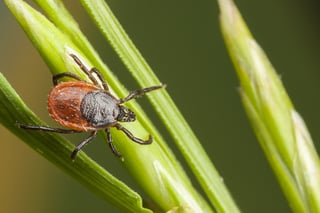Massachusetts tick control
Massachusetts ranked second in the nation for reported cases of Lyme disease in 2014, according to the Centers for Disease Control. This has Bay State residents on a heightened state of alert and it's why Burgess Pest Management is offering three tips for Massachusetts tick control. 
- If you hire a company to perform tick treatments, be armed with information. Ask about treatment methods, products, equipment, certification, and training for the technicians performing the treatments. Burgess Pest Management uses a 200-gallon hydraulic sprayer to apply a low-impact blend of products that has a residual effect. This method allows us to blast away tick and mosquito breeding grounds. Our technicians are fully licensed and certified by the State Department of Agriculture and we all meet and exceed the continuing education and training requirements mandated by the Commonwealth.
- Remove harborage zones. Ticks are moving in the brush, leaf litter, and debris surrounding your property. If you can reduce the clutter, you may reduce your exposure to ticks. Burgess Pest treats the property perimeter to create a barrier that ticks and mosquitoes don't like to cross.
- Stay consistent. If you don't follow the industry standard and allow treatments to be performed approximately every four weeks, the residual barrier around your property will be diminished, leaving your yard vulnerable for more ticks to infiltrate.
These three tips for Massachusetts tick control are designed to provide you with better information so you can make an informed decision when it's time to buy. If you have additional questions, a member of Burgess Pest Management's Massachusetts tick control team will be happy to help.


